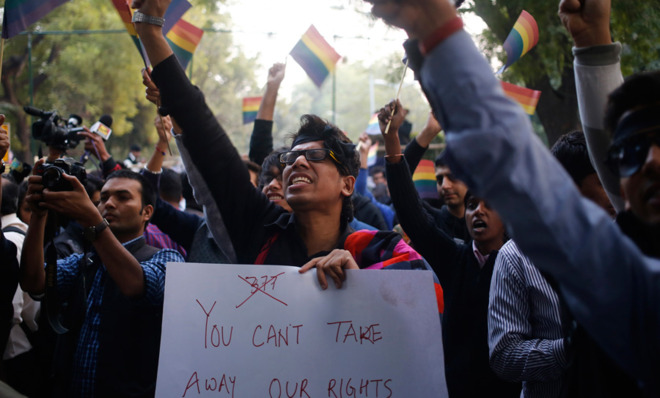India's gay sex ban shows why the LGBT movement must go global
Discrimination against gays is still widespread — and getting worse

A free daily email with the biggest news stories of the day – and the best features from TheWeek.com
You are now subscribed
Your newsletter sign-up was successful
Today's ruling by the Indian Supreme Court restoring the country's 150-year-old gay sex ban lays bare a disappointing truth: While the LGBT movement has made great progress in the West, it has faced numerous setbacks in other parts of the world.
India has now joined a number of countries that have taken extra legislative and political steps to limit the rights of non-heterosexual citizens, illustrating a disturbing global trend.
India's ruling reversed a 2009 lower court decision that struck down an 1861 law forbidding "carnal intercourse against the order of nature with man, woman or animal." Passed by the British Empire, the law makes homosexuality punishable by upto 10 years in prison.
The Week
Escape your echo chamber. Get the facts behind the news, plus analysis from multiple perspectives.

Sign up for The Week's Free Newsletters
From our morning news briefing to a weekly Good News Newsletter, get the best of The Week delivered directly to your inbox.
From our morning news briefing to a weekly Good News Newsletter, get the best of The Week delivered directly to your inbox.
Less than two weeks ago, Croatia passed its own ban on gay marriage, with a decisive 65 percent of voters saying they "agree that marriage is matrimony between a man and a woman."
Russia has also taken steps this year to stigmatize the LGBT community. By a vote of 436-0, the Duma banned "propaganda of nontraditional sexual relations," which severely curbs gay free speech rights. Jonathan Capeheart at the Washington Post writes that some fear that the law has even "laid the groundwork for the state to remove children from LGBT families."
These laws do not even scratch the surface of the state-approved horrors against the LGBT community. The International Lesbian, Gay, Bisexual, Trans and Intersex Association notes that five countries officially punish homosexuality with the death penalty: Iran, Yemen, Sudan, Mauritius, and Saudi Arabia.
Others, like Somalia and Nigeria, do not explicitly prohibit murdering gay and lesbian individuals. In 65 countries, homosexuality can be punished by at least 14 years in jail; in 10, sentences can run to life imprisonment. The fact that many countries turn a blind eye to crimes against LGBT individuals or offer no legal protection is another issue that is obviously harder to measure.
A free daily email with the biggest news stories of the day – and the best features from TheWeek.com
All of these international measures are important reminders that the LGBT rights movement has a long, long way to go. In a year that has seen some major gay rights success in the United States, as well as improvements in the public's attitudes towards homosexuality and same-sex marriage, it is easy to become complacent. But as the recent ruling in India shows, our domestic gains for LGBT rights do not necessarily translate abroad — and in some countries, the situation is worsening.
To be sure, no one is arguing that the LGBT movement has achieved all of its goals for the United States. On the contrary, when only 16 of the 50 states legally recognize same-sex marriage, it is clear how much work is left to be done.
However, 2013 has shown us how critical it is for LGBT advocates to focus their attention abroad as well. And it's important to remember that our domestic protections do little good for LGBT citizens traveling abroad. With the 2014 Winter Olympics in Russia fast approaching, that problem should become all the more clear.
Emily Shire is chief researcher for The Week magazine. She has written about pop culture, religion, and women and gender issues at publications including Slate, The Forward, and Jewcy.
-
 What to know before filing your own taxes for the first time
What to know before filing your own taxes for the first timethe explainer Tackle this financial milestone with confidence
-
 The biggest box office flops of the 21st century
The biggest box office flops of the 21st centuryin depth Unnecessary remakes and turgid, expensive CGI-fests highlight this list of these most notorious box-office losers
-
 The 10 most infamous abductions in modern history
The 10 most infamous abductions in modern historyin depth The taking of Savannah Guthrie’s mother, Nancy, is the latest in a long string of high-profile kidnappings